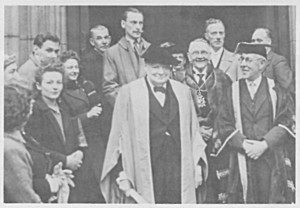Churchill’s Common Touch (3)
continued from part 2…
Part 3: Servants and Staff

Winston Churchill was a Victorian, with most of the attitudes of his class and time toward the common folk. “Servants exist to save one trouble,” he told his wife in 1928, “and sh[oul]d never be allowed to disturb one’s inner peace.”
Once before World War II he arrived in a violent rainstorm at his friend Maxine Elliott’s Chateau d’Horizon in the South of France. “My dear Maxine,” he said as she ushered him in, “do you realise I have come all the way from London without my man?” Never lost for words, Elliott replied: “Winston, how terribly brave of you.” (Quotations from Churchill by Himself.)
“When anyone came to his staff,” his his 1946-47 Scotland Yard bodyguard Ronald Golding told me,
Churchill treated them much as one of the family. We all know how plainly we speak to one’s spouse or children: no discourtesy is intended but there are no frills. This is how Churchill treated his staff. He just told them what he expected. His plain speaking ruffled some, but he was not being rude. It was just his way of getting the maximum done in the minimum of time. He worked his staff to the limit of endurance. When they reached the breaking point he became sympathetic and solicitous. They were gratified, and so continued beyond the limit of endurance!
Staffers who knew him only briefly and not well, like the American Phyllis Moir, who was his secretary on his U.S. lecture tour in 1931-32 and had the chutzpah to write a book about it, complained of his gruff manner. They were mistaking his single-minded intensity on the job at hand, whether it was compiling a gracious thank-you letter to a host or a major speech on Anglo-American relations.
William Manchester famously said that while Churchill’s “early reactions were often emotional, and even unworthy of him, they were usually succeeded by reason and generosity.” This extended to servants and staffers. When Churchill stopped to realize he was being too hard on someone, he would find a way to express his regret—but never directly.
Elizabeth Layton (later Nel), a secretary during the war who wrote an excellent memoir, recalled how she once had a very bad cold and was sniveling when he sent for her and was very demanding. He dictated a brief message and then took it from her: “That’s most beautifully typed,” he told her. He thought she was sniveling because of his impatience beforehand. Shortly after she went to work for him, Elizabeth told me, she burst into tears following his rude criticism of her typing. “Good heavens, you mustn’t mind me,” Churchill told her. “We’re all toads beneath the harrow, you know.”
Ronald Golding remembered an occasion at the London Churchill home at Hyde Park Gate, when visiting dignitaries arrived to bestow one of WSC’s many Freedoms of Cities:
After the ceremony, a glass of sherry and speeches, Mr. Churchill said, “Greenshields, bring the cigars.” The butler went away and came back with a cigar box, handing them around. The civic dignitaries lighted up, as did Mr. Churchill. He took one puff, hesitated, then fixed a stony stare at Greenshields: “Not these, you damn fool!” Churchill said in a stage whisper. Poor Greenshields! The butler had made the mistake of handing round Mr. Churchill’s best cigars.
Later, Churchill complimented Greenshields on the elegance of his manner!







One thought on “Churchill’s Common Touch (3)”
These comments seem to strike home. I think Churchill’s personality was so big it offended some people. And like a former military man or a strict school master he wanted order. But these interactions and reports are the ones I was referring too.
Comments are closed.